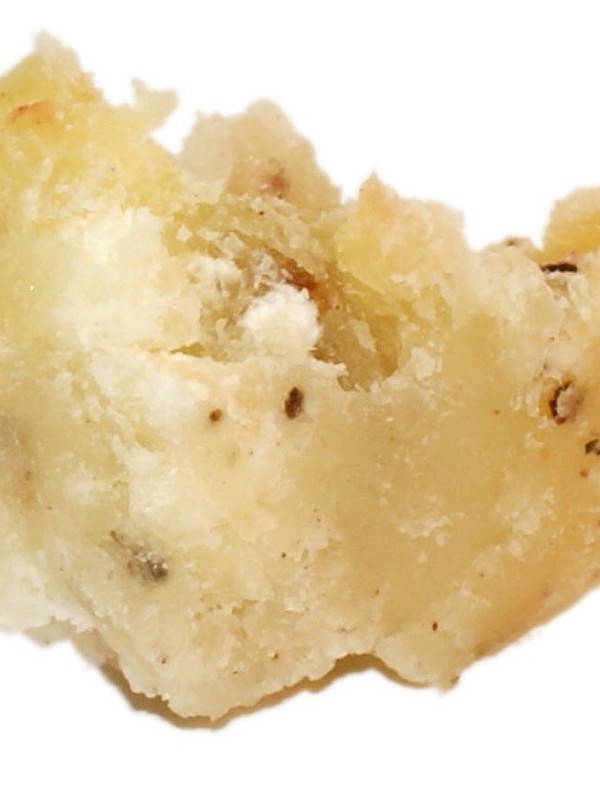Visokotehnološki materijali. Materijali za izradu kalupa, zalivne smole, pigmenti, minerali, ljepila, lakovi, premazi, modelarske mase...
Materijali i proizvodi za restauraciju. Ulja za drvo, pigmenti, smole, eterična ulja, bojila, boje, premazi...
Materijali za kreativno stvaranje. Izrada svijeća, prirodne kozmetike, izrada sapuna, ulja, voskovi, premazi, umjetničke boje, fototransferi...
Prirodni materijali. Premazi za drvo, pigmenti prirodne zemlje, premazi za kamen, pčelarstvo, sredstva za čišćenje, jestivo zlato i srebro, eterična ulja, ljepilo, platno, tamjan...
T: +386 1 8317 255 | Email: splet@samson-kamnik.si
Natural materials. Materials for making natural cosmetics, soaps, candles, materials for beekeeping and agriculture, natural coatings, ...
GUM ELEMI semi-solid 500 g
The name “elemi” is in the ordinary way practically restricted to the somewhat soft aromatic oleo resinous body
collected in the Philippine Islands from one or more species of Canarium, principally Canarium luzonicum. There are small quantities of other resins offered under the name elemi from time to time, but these are usually qualified by the name of the place from which they have been imported. In the fresh condition elemi resin is a mixture of resin with a certain amount of essential oil, of pale colour, and either soft and somewhat viscid, when it is known as soft elemi, or hard and semi-crystalline, when less essential oil is present. The smell of elemi reminds one of a mixture of lemon und turpentine. According to Dieterich the following resins are properly described as true elemi resins –
1. Manila elemi, from Canarium luzonicum
2. Yucatan elemi, from Amyris plumieri
3. Mexican elemi, from Amyris elemifera
4. Rio elemi, from various plants
5. Brazilian elemi, from Protium heptaphyllum
6. African elemi, from Boswellia freriana
7. East Indian elemi, from Canarium zephyrenum
Until quite recently the botanical origin of Manila elemi, which is the principal elemi of commerce, was a matter of speculation, but researches by the Bureau of Science of the United States of America have established the fact that the oleoresin is collected in the Philippines from Canarium luzonicum. The fresh oleoresin contains from 20 to 30 per cent. of an essential oil, which is composed mainly of hydrocarbons, of which the terpene phellandrene is the principal. The non-volatile resin consists largely of two easily crystallisable compounds, known as alpha-amyrin and beta-amyrin.
At one time elemi resin was used to a considerable extent in medicine, as an ingredient in various ointments and
plasters, but to-day this has entirely ceased, and it is principally employed in the preparation of printing inks, and, to a smaller extent, in certain types of varnish.
The characters of elemi resin differ according to the district in which it is produced.
There is a resin very similar in character to ordinary elemi resin, which is produced in Dominica, probably from
Bursera gummifera, the so-called gommier tree, and is known as gommier resin. It is of common occurrence in the forests of Dominica, and is collected and used by the natives for the manufacture of torches and incense. The resin exudes either from natural fissures or from cuts in the bark. It is at first an opaque whitish, viscous liquid, which soon dries into yellowish lumps of brittle resin. What little has reached the London market has been sold as “dry” or West Indian elemi.
The hard variety of this resin is completely soluble in alcohol and partially so in oil of turpentine, whilst the soft variety is completely soluble in turpentine oil, but only partially so in alcohol. Elemi resins from Southern Nigeria and from Uganda have also been imported and examined, and if carefully collected and exported in a clean condition, it is probable that these elemis would find a ready market as a substitute for the Manila product.
Essential oil of elemi s fragrant, with an odour recalling those of fennel, lemon and turpentine, a sp. gr. of 0,87 – 0,91, and is dextrorotatory. The terpenes present consist chiefly of phellandrene and dipentene. The resin of elemi consists of two substances, one, brein, soluble in cold, and the other, amyrin, in hot alcohol, the former occurring in the larger proportion (60 p.c.). The one soluble in hot alcohol is left when the elemi is treated with cold alcohol, and can be obtained in the form of white crystals, to the extent of 20 per cent., by crystallization from boiling alcohol. This resin is neutral. The water in which the elemi is distilled retains two crystallisable substances soluble in water to which the name of bryoidin and breidine have been given. Manila elemi also contains a small quantity of a crystalline acid named elemic acid, the crystals of which are larger than those of the other crystalline bodies above mentioned.
(from “Pitman’s Common Commodities and Industries, GUMS & RESINS – by Ernest J. Parry, London;
Printed by Sir Isaac Pitman & Sons, Ltd, Bath, England, v-(1465E))










